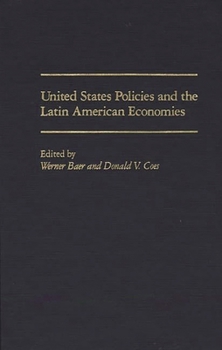United States Policies and the Latin American Economies
Written by a distinguished group of noted Latin American experts, this volume analyzes the complex economic relationship between the United States and Latin America during the 1980s and into the 1990s. As the editors assert at the outset, the United States has not had a cohesive policy toward Latin America since the Kennedy administration's Alliance for Progress. Instead, policy has vacillated, taking different positions on Latin American economic matters and requiring different actions on the part of Latin American governments. The essays collected here demonstrate in detail how the latent tensions among sometimes conflicting U.S. policy goals have been exacerbated by the economic crises of Latin America in the 1980s. Among the key topics addressed are the mounting debt crisis, privatization, Latin American integration, and the specific effects of U.S. policies on various aspects of Latin American economies.
The volume begins with an in-depth analysis of Latin America's debt crisis which concludes that U.S. policy in this area has often worked against our long-term interest in Latin America's return to higher real growth. Subsequent essays examine the contradictory position of the United States toward Latin America with regard to debt and trade relations, develop a model of an indebted nation that can be used to simulate future real growth and external-debt accumulation, and compare the effects of privatization in four Latin American countries. The remaining essays evaluate the performance of Argentine and Brazilian public enterprises, look at the impact of direct and indirect U.S. policies on Latin America's labor sector, study the implications of financial liberalization policies, and discuss Latin American regional trade arrangements. This book will be of interest to scholars, policymakers, and executives who deal regularly with Latin American issues.




